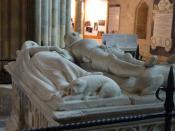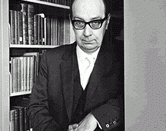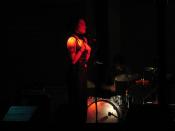Where is the Church Going? A Look at Philip Larkin?s Church Going Philip Larkin?s poem ?Church Going? is one of debate; there is a debate internal to the poem in that, as much as the narrator wants to dismiss all the custom and ritual involved with going to church, he cannot dismiss the church itself ? he cannot dismiss, nor can he explain, the feeling it gives him. A debate also seems to exist between the poet and the persona he has created in the poem; on the surface ?Church Going? seems critical of the irrationality of religion, yet it also hints that certain changes in society -- the elimination of tradition, and the death of seriousness ? might not be an essentially positive thing. Larkin sees the necessity of church going, and wonders what the world will be like when the churches have been abandoned, when belief itself has been abandoned.
Philip Larkin employs many tools in his meandering contemplations of the future of the church, churches and church going, but Larkin?s main weapons in this poem, as well as most of his others, are irony and satire. Larkin?s cynicism, humour and wit, combined with his bleak and dreary imagery, give the poem a very dark and very English feeling.
Larkin goes to some length to characterize his narrator, and this narrator doesn?t seem a likely candidate to be philosophizing on the future of religion. A cyclist, the narrator is not properly attired to be going to church. ?Hatless, [he] takes off his cycle-clips in awkward reverence? (8-9); although this quote exposes a certain inappropriateness in the speaker, it ironically lends towards the narrator?s qualifications as well; removing his cycle-clips is an act of respect ? although undoubtedly a strange and whimsical one. The character?s dualism continues in his description of the church?s interior; he can identify most of the sacramental objects within it, which lends to his credentials, but some of his descriptions of them are satirical; he calls the hymnals ?little books? (4), and refers to the altar as ?the holy end? (6). He further satirizes the church in his overly solemn imitation of a service; he preaches to the empty room ?Here endeth? (15).
The narrator?s description of the setting is bleak, and leads to a feeling of emptiness; moreover, this emptiness seems not just a physical emptiness, but also a spiritual emptiness in the church, in religion and in society. Right from the start of the poem where the speaker proclaims that there is ?nothing going on? (1), and as the door ?thud[s]? (2) shut, this emptiness is implied. The building is void of signs of life; dead flowers ?cut / for Sunday, brownish now? (4-5), effectively illustrate this. ?And [the] tense, musty, unignorable silence, / [that] Brewed God knows how long? (7-8), is only broken when the narrator?s shout of ?Here endeth? (15) bounces off the walls. This empty room exposes itself as wholly unmystical, and the narrator reflects that it ?was not worth stopping for? (18). He donates an Irish sixpence as he leaves; this is an empty gesture, and a very British allusion, as an Irish sixpence is worthless.
The opening scene of this poem is not completely worthless, however, as it provides the context for the reflections that make up the body of the poem. The speaker contemplates the future of churches, wondering if some will become like museums; ?A few cathedrals chronically on show? (24). In this he is mocking the antiquity of religious belief and custom, which he goes on to compare to simple superstition. He asks if when churches become abandoned will they come to be known as ?unlucky places? (27); or will they become magic places, where ?dubious women come / To make their children touch a particular stone; [and] pick simples for cancer? (28-30). The text points out that simples are medicinal herbs, but the connotation of the word simple is that of simple-minded; the narrator is comparing religion to superstition, and that church goers, like all people that believe in superstitions, are stupid. Larkin likens churches to haunted houses, places where you go on an ?advised night to see a walking dead one? (31); church goers believe in a Holy Ghost, and go to worship it on an advised day. But the narrator holds that superstition and belief will fade, and wonders what will become of churches when that is the case.
The narrator changes course, as he wonders not about the future of churches themselves, but begins to consider the future of the practice of church going. The speaker asks: as a church crumbles into ruins, and the ?purpose? (38) of these ruins grows ?more obscure? (38), who will be the last people to go to these places ? the last church goers? The poems scrolls through a list of options: historians, antique collectors, ?Christmas-addict[s]? (43) looking for mementos, or someone akin to the narrator himself, ?bored [and] uniformed? (46), yet interested in the church for deeper reasons than its his history or its paraphernalia. The narrator is interested in the church for what it once represented: ?marriage, and birth, / And death? (50-51).
In his speculations on the church, the narrator disarms himself of his own skepticism, and comes to some realizations of a church?s necessity. He looks upon the church as a ?serious house on a serious earth? (55), and even in a society where seriousness and belief are on the decline ? a society, which he is a fair representative of ? the purpose of the church ?can never be obsolete? (58). The essential function of church is best expressed in the poem itself: Since someone will forever be surprising A hunger in himself to be more serious, And gravitating with it to this ground, Which, he once heard was proper to grow wise in, If only that so many dead lie around (59-63).
This is in no way an affirmation of the Christian faith, but of the church as an important place to meditate on life?s unanswerable mysteries ? a house of metaphysical thought. But even in this concession of the importance of churches Larkin takes one more stab at church going: that people are sitting around growing wise until they die.
That is the nature of the whole poem; it is conflicted, struggling against itself. Larkin?s narrator has a logical and merited cynicism about the role of the church in society, and is very skeptical about the future of churches; yet he can?t fully dismiss them. Larkin is looking for answers about himself, about his existence, and as the poem evolves it turns from a satirical dismissal of church, to an affirmation of a church?s role as a place of silent contemplation. It lures the skeptical reader in -- with cynical humour, laced with satire and irony -- and then in a moment of epiphany dismisses that skeptism and persuades the reader to admit that the church has some legitimacy. This poem answers no questions, but instead sparks debate; often debate with one?s self, in that it is so effective in cutting the church down, satirizing it throughout the poem and presenting a very bleak likeness of it, that when it finally presents the church as a viable place of meditation, you don?t know what to think.
Bibliography Larkin, Philip. ?Church Going.? in The Longman Anthology of British Literature. Vol. 2C The Twentieth Century 2nd ed. Kevin Dettmar and Jennifer Wicke, eds. New York: Addison-Wesley Educational Publishers Inc., 2002. 2805-2806.



